


|
| ||
|
|
|
|
|
|
SILVER EDITION

|


|
SILVER EDITION |
|
Publication History
Cover Overview |
Reviews and Previews
Chapter Overview |
Word Cloud
[NEW]
First Chapter Preview [NEW] |
Cover Gallery (year)
Cover Gallery (edition) |
 Cover Overview
Cover Overview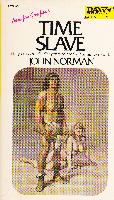
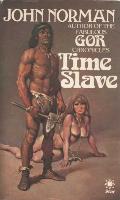
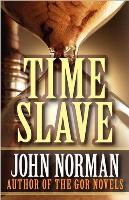
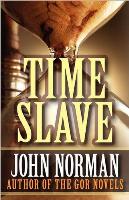
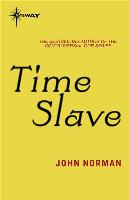
 Reviews and Previews
Reviews and PreviewsIn Time Slave, John Norman didn't use any titles for the 36 chapters in the book.
 Word Cloud
Word CloudThe image below shows the most often used words and terms within Time Slave. The larger the size, the more often the word or term occurs in the text.
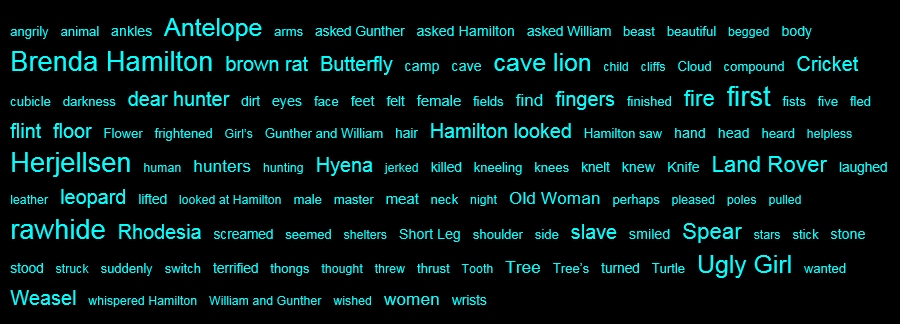
 First Chapter Preview
First Chapter Preview1
Herjellsen’s device was deceptively simple.
Had he not been insane, had he not been an isolate, lonely, scorned, maddened, dissociated and crazed, the uniqueness, the simplicity of it, would doubtless not have occurred to him.
It was irrational.
It was as irrational as existence, that there should be such. The void was rational, space, emptiness. That there should be anything, gods or particles, that was the madness.
That there should be anything, that was the madness.
Dr. B. Hamilton, mathematician, Ph.D. California Institute of Technology, looked up, fingering the pencil.
It seemed startling, wondrous, that it should be.
As wondrous as suns and stars, the passage of light, and the slow turnings in the night of luminous galaxies.
Who could have predicted that there should be being? From what discursive statements of initial conditions and laws should such a prediction follow? And in the nothingness what entities might serve as values for those individual constants, and as values for those variables, for in the void there was nothing.
From nothing can come nothing.
Dr. Hamilton lit a cigarette, and drew on it, angrily, defensively.
But smoke cannot screen thoughts from themselves.
It did not appear to be a truth of logic, a matter of the meanings of words, or even of the possibilities of thought, that nothing could come from nothing.
Surely one could imagine nothing, and then something. It was imaginable, and whatever is imaginable is logically possible, conceptually possible.
Yet in some sense it did seem true, so true, that from nothing could come nothing.
It made no sense to call it a necessary truth, for its negation was semantically consistent, conceptually possible, and yet it seemed, somehow a strong truth, a likely truth.
Astronomers had speculated that, even now, matter grew, forming in the blackness.
Dr. Hamilton studied the smoke. It drifted upward toward the fluorescent tubes, lit from the compound’s generator.
If it could come into being, there seemed little reason to suppose it might not be doing so still.
But it did not seem likely.
The quantity of matter-energy in the universe remains constant.
This was an article of faith, of a transient science in a provisional epoch.
But it might be true.
But if it were true then matter, or its forms, or energy, or its forms, of which particles and smoke might be illustrations, and music and worlds, then the substance-whatever it might be-was eternal, coeval with space. There was nowhere for it to come from, nowhere for it to go.
Dr. Hamilton crushed the cigarette out.
Who was to say what was, ultimately, rational or irrational, for these are anthropomorphic predicates, indexed to the brain of an evolving primate, only within the last few thousand years discovering itself in the midst of mysteries.
The lights in the bleak room dimmed and then again waxed bright and soft.
Gunther, with William, Herjellsen supervising, was busy in the hut.
There was not a great deal of power needed for the apparatus. The compound generator produced ample power.
Hamilton speculated, smiling. Electric power, from a gasoline-driven engine, no more than five hundred volts, was ample to the needs of the crazed Herjellsen.
Hamilton did not care for Hegel. Yet the thought, that of Hegel, was difficult to dismiss. We are where the world has opened its eyes.
We were the first animal, to our knowledge, to wonder, to seek to learn, the first to seek not only love and food, but truth.
Men had found truths, in their millions, in its pebbles and grains, but he had not yet found its mountains.
Herjellsen had looked in a different direction. If he had not, he would not have seen what he had.
Herjellsen was mad, but he had seen it, where others had not.
It had come to him in the night, in his cell in Borga. He had screamed and laughed, demented in the cell, tearing the blankets, biting at his own flesh, shrieking with joy.
Hamilton recalled that Kekule’s hypothesis, of the ring theory of the benzene molecule, had come to him in sleep, in a dream, fraught with twisting snakes, before his own hearth. Three-quarters of organic chemistry, some thought, derived, directly or indirectly, from Kekule’s hypothesis. Herjellsen’s had come to him in a madman’s cell. There is no rational procedure for the discovery of hypotheses. There are no machines to produce them. They come as gifts, and sometimes to the mad, to the diseased and crazed, as to Herjellsen. But the procedures for testing hypotheses, be they real hypotheses, if they are genuine hypotheses of science, are public, accessible. The objectivity of science lies not in its genesis, but in its warrants for validity, its procedures for examination and testing, for experiment and confirmation, for, to the extent possible, proof and demonstration. Hamilton was terrified, yet exalted.
It was possible that the Herjellsen conjecture was true.
The preliminary tests had been affirmative.
Again the fluorescent tubing dimmed and then again resumed its normal degree of illumination.
The artifact lay not more than a yard from Hamilton’s hand.
It was rounded, chipped, roughly polished; it weighed 2.1 kilograms. Anthropologists would have referred to it as a tool. It was a weapon.
That there was something, that was the madness.
Who was to say what was natural and what was not? That there was something was undeniable.
Its nature had not yet been ascertained.
Hamilton arose, pushing back the chair.
A remark of Julian Huxley was difficult to dismiss from the mind.
The universe may not only be queerer than we suppose, but it may be queerer than we can suppose.
Hamilton smiled.
Laughter is the shield. Humor is the buckler against madness, against the mystery, against the immensity. Humanity had little else with which it might protect itself in the forest. It had its brains, its hands, a bit of fury, a loneliness for love, and its laughter. And that laughter, like the gravitational field of a pencil on a desk, miniscule and yet profound, might be heard to the ends of space.
We are smaller than stars but the magnitude of our laughter has not yet been measured.
All that we know rests upon a slender data base, our first-person experiences, and nothing else. Each of us in this sense is alone, in his cage of sensation, limited to his own perceptions. And each of us, a perception to the other, builds his view of the world.
Hamilton was lonely.
How do we explain the succession, the continuity of our experiences. We postulate an external world of such-and-such a type. In various times and places we would have entertained postulations quite different from those which are now taken to define the truth, and beyond their perimeters we define madness:
Herjellsen had ventured beyond the perimeters of the given speculations, the customary postulations, those postulations that define not only what answers may be given but what questions may be asked.
Particles and forces, gods and demons, fields, purposes, collisions, all had served, and some still served, to make sense out of the chaos of sensation, that which must be reconciled and accounted for, our experiences.
Science is not a set of answers, Herjellsen had once told Hamilton; it is a methodology.
We learn from Egyptian star charts that the positions of the fixed stars have changed in the past five thousand years.
They change position slowly.
So, too, with the dogmatisms of science; what seemed eternal truth when the Parthenon was fresh seems now but a mood of cognition, a moment of advance, a footstep on a path whose destination is not yet understood.
Perhaps a thousand years from now, Hamilton thought, we will see that our current truths, too, were not the eternal verities we took them for, but rather another step on the same journey, leading perhaps toward a truth we do not now understand and may forever fail to comprehend. We must not despise ourselves, Herjellsen had cried, even though we shall pass, and shall be superseded in our turn, for we are a moment in a grand journey, one that began in the caves and must someday, if we do not slay ourselves, take us to the stars.
I have an appointment, he had laughed, with Arcturus, and with infinities beyond.
But Herjellsen was dying.
He was mad.
Hamilton went to the door of the room, and looked out into the Rhodesian night.
The work of Herjellsen had nothing to do with the stars.
Why should he insist that it did? He was mad.
Hamilton looked back at the artifact on the table. It weighed 2.1 kilograms. Anthropologists would have termed it a tool. It was a weapon.
Herjellsen’s work did not have to do with the stars.
What is on the other side of our sensations? Is it truly atoms and the void, or is it an alternative reality?
We may only postulate, and test.
Hamilton could hear the generator now. A black servant was crossing the compound, a box on his shoulder.
There were only two blacks in the compound. The moon seemed bright over the high, wire fence.
Hamilton stepped out on the porch. It would not be wise to stay outdoors too long. It was late in summer.
Hamilton looked at the moon. Then, Hamilton looked at the stars.
There was. a reality. It was only that its nature had not yet been ascertained.
It was, Hamilton supposed, a reality beyond contingency or necessity, as we might understand such things. Such predicates were unintelligible in their application to what most profoundly existed. Hamilton thought of Scbopenhauer’s Wille, never satisfied, violent, craving, inexhaustible, relentless, merciless, demanding, greedful, incessant, savage; of Nietzsche’s Macht; of the atoms of Lucretius; of the god of Spinoza, one with the terribleness and sublimity of nature. The reality, conjectured Hamilton, is more profound than gods and men. If there be gods, they, too, are its offspring, as much as stones, and twigs and men, as much as the spaniel and the mosasaur, as much as the pain of love, the smile of a child, the gases of Betelgeuse, the tooth of the shark and the chisel of Michelangelo. It is a reality which may have spawned us, in a moment of bemusement, if only to set us its riddle, to watch us sniff about, and scratch and dig, to try to find truths which it has perhaps, in its irony, not constructed us to understand; the reality, perhaps, once fathering us, has forgotten us, leaving us to one side as a neglected toy, no longer of interest, or perhaps, a sterner father, has abandoned us that we may learn how to grow by ourselves, and be lifted only should we rise upon our own feet; seek me in the godship, it might say; I am waiting for you; but to Hamilton it seemed that the reality, what ever might be its nature, was clearly beyond morality; it was as innocent of morality as the stones of the moon, as the typhus bacillus, as the teeth of the Bengal tiger. The world was built on greed, and on killing, and hunger. To the reality doubtless the barracuda, in its way, was as perfect as the saint. The reality did not choose between them. They were both its children. Hamilton shuddered. The reality was sublime; before it even worship was an affront, a blasphemy. It wanted nothing of men. It needed nothing. It was sufficient unto itself.
But its nature? What was its nature?
Herjellsen did not know, but he had learned that its nature was not as men now thought.
Herjellsen had discovered a small thing. A clue, not well understood.
He did not know, truly, what he was doing.
But he would do it.
I do not understand this, he had said, but I see how I can use it, and I will! I will use it!
Man will go to the stars, Herjellsen had cried.
But what had the stars to do with Herjellsen’s work?
Hamilton recalled the artifact lying in the bleak room. It had little to do with the stars.
At best, it lay at the beginning of an infinity.
Yet, like zero, a nothingness, it, like each instant, both initiated and terminated an infinity.
The artifact, like each moment, was an end and a beginning, a pivot between complementary, divergent eternities.
The Romans saw this, in their sternness, their solemnity and sadness, and pride, and called it a god, and called it Janus.
I see two ways, said Herjellsen. I am Janus.
Herjellsen is mad, had laughed Gunther. Hamilton did not doubt that.
But the Herjellsen conjecture? What if it were true?
Heraclitus has seen it, had laughed Herjellsen. Hamilton’s thoughts drifted to the ancient Ionian, the poet and philosopher. I had rather discover one cause, had written Heraclitus, than become the King of Persia. He had taught all is fire. A man cannot step twice into the same river.
I believe all is pea soup, had said William. And I have often stepped twice into the same river. I stepped twice into the Thames, and once fell into it while punting.
Hamilton smiled. William made the compound bearable.
Hamilton, too, had speculated if all might not be pea soup. It seemed a plausible guess.
Herjellsen had not been offended. That all is transience, flux-fire-is only part of the teachings of Heraclitus, he had told William. And then Herjellsen had quoted the Greek, that swift, liquid tongue sounding strange in the careful, northern accents of Herjellsen-the way up and the way down are the same.
I never doubted it, had admitted William.
Herjellsen had smiled at Hamilton, lifting a fork. And the beginning, he had said, is the end, and the end is the beginning. That is what Heraclitus had seen.
I do not understand, had said Hamilton.
Time does not pass, said Herjellsen. No. It is we who pass.
Hamilton had not responded. Herjellsen, in his late fifties, bald, small eyed, the eyes seeming large behind the thick, ovoid lenses of his wire-rimmed glasses, had peered at Hamilton. Herjellsen was a large man, but short, a broad, short man, with large hands. His head was rounded and unusually large, set on a heavy neck. Yet he seemed gentle. There was usually a sheen of sweat on his forehead and cheeks, and almost always when he spoke. Herjellsen seemed to speak easily, but he was uncomfortable in doing so. He was free only when lost with his own thoughts. He seemed to fear even Hamilton. His speech, with its Finnish accent, was precise and fluent. He rarely, even in English, made a grammatical error or hesitated in his expression, or wavered in the selection of a word or gesture. His mind worked apparently with such rapidity that he spoke as though he had spoken these thoughts before. Hamilton wondered if he had.
What if the Herjellsen conjecture were true?
Hamilton put aside the thought. The conjecture could not be true.
In a sense, though, Hamilton was willing to suppose that he had. He had conceived of them, and examined them, and then rephrased them and organized them, in the lapse of time perhaps of a syllable’s utterance, and then, as though they might have been carefully written, he spoke them. Herjellsen seemed a gentle man. It was difficult to believe that he was criminally insane, that he had, in his time, in the course of strange robberies, killed four men.
In the cell at Borga could it have been the truth that he had seen?
But Herjellsen whatever the flaws of his being, was a scientist. He well knew that self-evidence was a psychological variable, differing idiosyncratically from individual to individual, from culture to culture. Hamilton knew of men to whom it was self-evident that a piece of string forming a closed figure, in any shape, would inclose the same area. Standing on the porch Hamilton quickly lit another cigarette, and watched the lights in the window of the experimental shack. The lights in the small, rectangular, metal-roofed, stuccoed building waxed and waned with the humming whine of the generator. Such obvious falsities could be taken as selfevident by some men, at least for a time, and yet their patent falsity could be in a moment demonstrated empirically. And there had been men who had believed that motion was impossible, for nonbeing could not exist and thus, motion requiring place, or emptiness, or nonbeing, could not exist. To such men the self-evident had withstood the contradictions of their own eyes. Experience must yield to reason; fact to illusion. But Herjellsen was a scientist. He distrusted the light of reason, the flash of intuition, and more sternly in his own case than in that of others. There can be no genuine hypothesis without test. A truth must have its disconfirmation conditions.
The test sequence had begun.
The lights grew brighter in the experimental shack, and then dimmed.
What had come to him like wine, like the gift of a drunken god, the bequest and gratuity of a laughing Dionysus, inexplicably to a criminal in a madman’s cell in Borga, was now being subjected to test in a small shack in an isolated compound in the dry lands of Rhodesia, some two hundred and fifty miles southwest of Salisbury.
Hamilton thought of fire burning in the thieving hand of Prometheus.
The first test sequences had been fruitless. Herjellsen had sought perhaps a hundred tests to subject his conjecture to experiment, and each had failed; the conjecture had neither, to a rational degree, been confirmed nor disconfirmed; data had been unclear; results were irrelevant or indecisive; new procedures had been sought; and then, after months of work, found; it was only then that Gunther and William, and Hamilton, had been brought to the compound.
Hamilton regretted having come. The retainer had been impossible to resist, and Hamilton, in the tense job market, had been without position. The position was to last four weeks. Already Hamilton had been at the compound more than two months. The supply truck no longer came. Herjellsen himself, in his British Land Rover, to which he kept the keys, made overland journeys to Salisbury and back, taking Gunther and William with him. Hamilton was not permitted to accompany them. Hamilton had received traveling expenses from California and an initial fee of four hundred British pounds. But Hamilton had received nothing further. Hamilton wanted to return to the United States.
“We need you,” had said Herjellsen. “You may not leave now.”
“I will tell you who Herjellsen is,” had said Gunther, speaking to Hamilton privately. He showed Hamilton, too, the clippings, the police bills.
Hamilton was not permitted outside the compound. The blacks saw that Hamilton remained in the compound.
“Do your work, Doctor Hamilton,” had said Herjellsen. “We need you.” Sweat had broken out on his broad forehead. His hands had opened and closed.
“I will walk you to the shed,” had said Gunther.
“No,” Hamilton had said. “I will go alone.” Hamilton feared Gunther. Hamilton did not care for Gunther’s eyes. They frightened Hamilton.
Hamilton threw away the cigarette, onto the dry dust of the compound.
The high wire fence about the compound was said to protect the compound from animals. It was electrified. Hamilton was not permitted beyond the fence.
Prometheus had stolen fire. Herjellsen was kindling it.
The Greeks were not children. The legend of Prometheus was not a child’s explanation for man’s possession of fire. It said rather that fire was what would make men akin to the gods, and like unto the gods themselves. It would bring them above the beasts. It might take them, in the eruptions of flaming engines, to the stars.
And the Greeks were wary, for this might be pride in men, and carry in it the seeds of their downfall. Prometheus had expiated his crime, chained to a rock in Scythia, his body prey to the avenging eagle of Zeus, but while he screamed in the sun, beneath the beak and talons, the ships, in their thousands, carrying coals of fire, set forth from the rocky inlets, to colonize a world.
Man will go to the stars, had cried Herjellsen. He will put his flags, and his children, beyond the perimeter of Orion; he will make his camps on the shores of Ursa and build cities in the archipelagoes of Antares and Andromeda.
Hamilton wondered if Prometheus might have regretted his decision.
Herjellsen sometimes spoke of Prometheus.
“Did he regret his decision?” had asked Hamilton of Herjellsen, amused, for Herjellsen seemed to take such tales seriously.
“I do not regret what I have done,” had said Herjellsen.
Hamilton had not pressed the matter further. Nothing more had been said at the meal.
Herjellsen was mad.
He was also a dying man. He had angina pectoris, and was subject to attacks of increasing severity. He drove himself cruelly, foolishly, mercilessly.
The generator whined to a halt.
The lights in the experimental shack went out.
Hamilton was startled.
The four light bulbs, set on poles about the compound, had been extinguished, and the dust of the compound was no longer the bleak, bright reflecting surface that it had been, hot, hard and yellow, but now, in the light of the African moon was white and cold.
The door to the shack opened. One of the blacks, a lantern swinging in his hand, went to the door. William slipped from the door, swiftly.
He passed Hamilton. “I must get my bag,” he said.
“What is wrong?” asked Hamilton, frightened.
“It’s the old man,” he said.
Hamilton tensed.
William had gone to the hut he shared with Gunther. In a moment he emerged, carrying his bag.
William was a physician. He had practiced in London. He was also a gifted mathematician. Many of the equation resolution procedures which Hamilton had programmed into Herjellsen’s analyzer, a modified 1180 device, had been provided by William. A condition of Hamilton’s employment had been, oddly, a medical examination in William’s London office. “The employer,” had said William, indicating the man Hamilton was later to learn was Herjellsen, “requires excellent health in those working in his service.” Hamilton had understood that the employer’s facility was in Rhodesia, in an out of the way area, and that medical facilities would not be readily available. Hamilton had been surprised to learn, later, that William was a member of the staff at the compound. He had arrived, returning to the compound, the day before Hamilton. Gunther, and Herjellsen, and the blacks, had been waiting. His quarters were well stocked with supplies. He himself, Hamilton was aware, was a competent, respected physician. Medical facilities, it seemed, were quite adequate. Perhaps, Hamilton had speculated, the employer is a hypochondriac, with a phobia concerning infections, or some such affliction. But Herjellsen, Hamilton had learned, was not a hypochondriac. Indeed, he was an actually ill man, a desperately ill man who took too little care of his own body.
Hamilton moved as though to leave the porch. “Do not come to the shack,” said William sharply. It was unlike William to speak sharply.
“Oh,” said Hamilton. “Very well.” Hamilton had never been allowed in the experimental shack.
William disappeared in the door of the shack. It closed behind him. Hamilton could see the light of the black’s lantern through the white-painted window.
It had been Hamilton’s health in which Herjellsen had been critically interested. Not his own. “You are in superb condition,” had said William in his London office. “The employer will be pleased.”
The work that Hamilton had performed in the compound Hamilton had discovered could have been performed by Herjellsen himself, or Gunther. Hamilton had done a great deal of work, but it was not work which only Hamilton, of those on the staff, could have performed. The services of Hamilton, it seemed, were not, strictly, required.
“It frees us for other work,” Herjellsen had said, “and, too, should one of us be unable to function, another will be able to take his place.”
“Skill redundancy,” had added Gunther, “is policy with Herjellsen.”
“I expect to be able to function,” had smiled Hamilton.
“I am confident,” had said Gunther, “you will fulfill all our expectations.”
Herjellsen, then, with Continental gallantry, had lifted his glass of wine to Hamilton. Hamilton had looked down at the table.
But the services of Hamilton, Hamilton had come to discover, more and more, day by day, were truly not needed. Two nights ago Hamilton had, deliberately, slipped an error into the print outs. Herjellsen, in less than fifteen minutes, had discovered it.
“This was careless of you, Doctor Hamilton,” he had said, “-and obvious.”
Herjellsen himself had corrected the program and completed the run.
“I wish to leave your employment,” Hamilton had told Herjellsen that evening.
“You are needed,” had said Herjellsen.
“I am not needed,” had said Hamilton.
“You are mistaken,” had said Herjellsen.
Now Hamilton stood on the porch of the computer building and looked to the experimental shack. “For what am I needed?” had demanded Hamilton. Herjellsen had said only, “You are needed,” and then left. The experimental shack was dark, save for the light of the black’s lantern, like a flickering pool within the white-painted window. Hamilton wondered if Herjellsen were dead.
After that night, that of the computer error, Hamilton had done little work, but much reading. Herjellsen provided books. Among them were an English translation of Diogenes Laertius, the Ancilla of Pre-Socratic Fragments, translated by Freeman, from Diel’s original translations, Kirk’s book on Heraclitus, Plutarch’s Laves, the autobiography of Benvenuto Cellini, FitzGerald’s second translation of the Rubaiyat of Omar Khayyam; Harrison’s Prolegomena to the Study of Greek Religion; in German, Nietzsche’s Also Sprach Zarathustra; Whitman’s Leaves of Grass; and the Meditations of Marcus Aurelius.
“You are needed,” Herjellsen had said.
Frightened, Hamilton looked at the fence which encircled the compound.
Hamilton was not permitted beyond the fence.
The fence was to protect the occupants of the compound from the predations of wild animals.
“It is dangerous beyond the fence,” Herjellsen had told Hamilton, and given his orders. Hamilton was not permitted by the blacks beyond the fence.
There were no animals dangerous to men in the vicinity that Hamilton knew of.
She wondered why the blacks were armed.
Hamilton was not permitted beyond the fence.
“No,” had said the black with the rifle at the gate, when Hamilton, testing Herjellsen’s order, had attempted to leave the compound. The black had not been rough. Hamilton was simply not permitted to leave.
It was not necessary for the black to threaten, or resort to his rifle.
Hamilton had looked up at the ebon face.
Frustrated, furious, Hamilton had turned about and returned to the computer building.
That night, at supper, Herjellsen had admonished Hamilton.
“My dear Doctor Hamilton,” had said Herjellsen, “you must not leave the compound. I had thought that was clearly understood.”
“I wanted to take a walk,” had said Hamilton icily.
“It is dangerous outside the compound,” said Herjellsen.
“Very well,” had said Hamilton.
Hamilton stood on the porch of the computer building. No one had emerged from the experimental shack since William had entered.
“You are needed,” Herjellsen had told Hamilton.
Hamilton looked at the high wire fence, slim strands of strung wire, lit in the white light of the great moon.
For what am I needed, wondered Hamilton.
The moon glinted on the wire.
There was a sound at the shed.
One black emerged, and then, between him and William, staggering, Herjellsen.
The two men supported Herjellsen, and made their way across the ‘compound, toward Herjellsen’s small sleeping shack.
“We can move you on a cot,” said William, supporting the short, older man.
“I can walk,” said Herjellsen, pushing him away. Then, too, he pushed away the black. Another black, he with the lantern, stood behind them.
Herjellsen stood unsteadily on the dust of the compound, hunched over with pain. His face was tight, ashen.
“Do not help me,” he warned them.
William and the two blacks, one with a lantern, stood to one side.
Herjellsen saw Hamilton. He straightened up. “Good evening, my dear Doctor Hamilton,” he said.
“Good evening, Professor Herjellsen,” whispered Hamilton.
“Yes,” said Herjellsen, looking about. “It is a good evening.”
Gunther was still in the shack. Hamilton had not seen him come out.
“I think I shall go to my quarters,” said Herjellsen. “I am weary.”
William put out his hand.
“I need no help,” said Herjellsen, sharply.
William glanced at Hamilton.
Herjellsen wished to show no weakness before Hamilton.
“Good-night, Doctor Hamilton,” said Herjellsen.
“Good-night, Professor Herjellsen,” said Hamilton.
A voice within the shed suddenly cried, “Bring the lantern!” Hamilton was startled. It was Gunther’s voice. She had never heard such a cry from him.
Herjellsen did not move, but stood on the dust of the compound. He did not turn to the shed.
The black with the lantern rushed to the shed.
Hamilton waited on the porch.
Herjellsen stood quietly in the compound. William looked to the shed. He seemed frightened.
Gunther’s figure emerged from the shed. He was a tall man, large, broad-shouldered, blond haired, muscular, blue eyed. He was a strong man, hard, lithe, swift. He had much stamina. He enjoyed hunting, and was a superb hunter, skilled, tireless, merciless, efficient. Next to Herjellsen, whom Hamilton regarded as mad, Gunther was rated by Hamilton as the most intelligent in the compound. Gunther’s mind was brilliant. It could be, at times, as sharp and keen as surgeon’s steel, and like that steel, cold and hard; and at times, when he pleased, it could be as sardonic as acid; or, when he wished, as swift and stinging as a quirt in the hands of a horseman. Hamilton feared him. In his presence Hamilton felt uneasy, and small and weak. Before Gunther, Hamilton felt clumsy, and found it difficult to speak. What Hamilton felt, not understanding it, in the presence of Gunther, was the presence of a superior, dominant animal. Gunther was clearly stronger and more intelligent than Hamilton. “He is a bit overawing,” had joked William. Hamilton resented Gunther. Hamilton hated him. William, too, resented him. It was a bond between them, their dislike for Gunther. It was not simply that Gunther was a splendid organism, but that he made no attempt to conceal his superiority. He seemed little motivated by the conventions whereby superior animals sheath their claws and conceal their teeth. Gunther was a lion among men, a blond lion. His eyes made Hamilton angry, and afraid. He looked at Hamilton with such casual, unquestioned superiority, as though Hamilton might have been a servant, and, too, he looked at Hamilton in another way, sometimes grinning, that frightened Hamilton. He seemed so sure of himself, so strong.
“What is it?” asked William of Gunther, who stood, dazed, as Hamilton had never seen him, in the door of the experimental shack.
Hamilton was frightened.
Never had Gunther seemed so shaken. His tall, muscular frame trembled in the doorway.
Then he spoke. “The cage,” he said, “-the cage is gonel”
Herjellsen, Hamilton thought, seemed to smile, and then he began to walk slowly to his sleeping quarters.
William and the black who had attended Herjellsen waited for Gunther, who walked slowly towards them.
Gunther looked at William. “The cage is gone,” he said.
“Impossible!” cried William. William ran to the shed.
“I don’t understand, Gunther,” said Hamilton. “What cage?”
Gunther did not answer Hamilton but turned to face the shed.
In a moment William, followed by the black with the lantern, who understood no more than Hamilton, emerged from the shack.
William’s face was white. “It’s gone,” he said.
“Gunther!” said Hamilton.
But Gunther had turned away and was walking slowly toward the hut he shared with William.
“William!” cried Hamilton.
“Yes?” said William, looking at Hamilton on the porch.
“What cage is gone?” begged Hamilton.
“The one we were using in the experiment,” said William, slowly, blankly.
“What does it mean?” begged Hamilton.
“It means, I think,” said William, smiling thinly, “that the Herjellsen conjecture is true.”
Hamilton stood silently on the porch.
“Good-night, Brenda,” said William.
“Good-night, William,” said Brenda Hamilton.
 Cover Gallery (year)
Cover Gallery (year)Here is a cover gallery showing all the editions and printings of Time Slave, sorted by year of publication. Click on any cover to see the book.


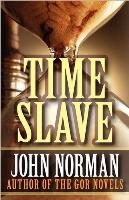



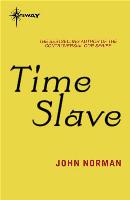
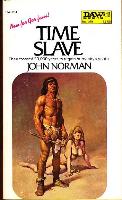
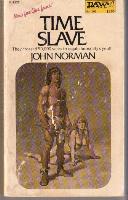
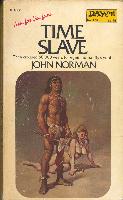




 Cover Gallery (edition)
Cover Gallery (edition)Here is a cover gallery showing all the editions and printings of Time Slave, sorted by edition. Click on any cover to see the book.














 This page is copyright © 2000/2013 by Simon van Meygaarden & Jon Ard - All Rights Reserved
This page is copyright © 2000/2013 by Simon van Meygaarden & Jon Ard - All Rights Reserved